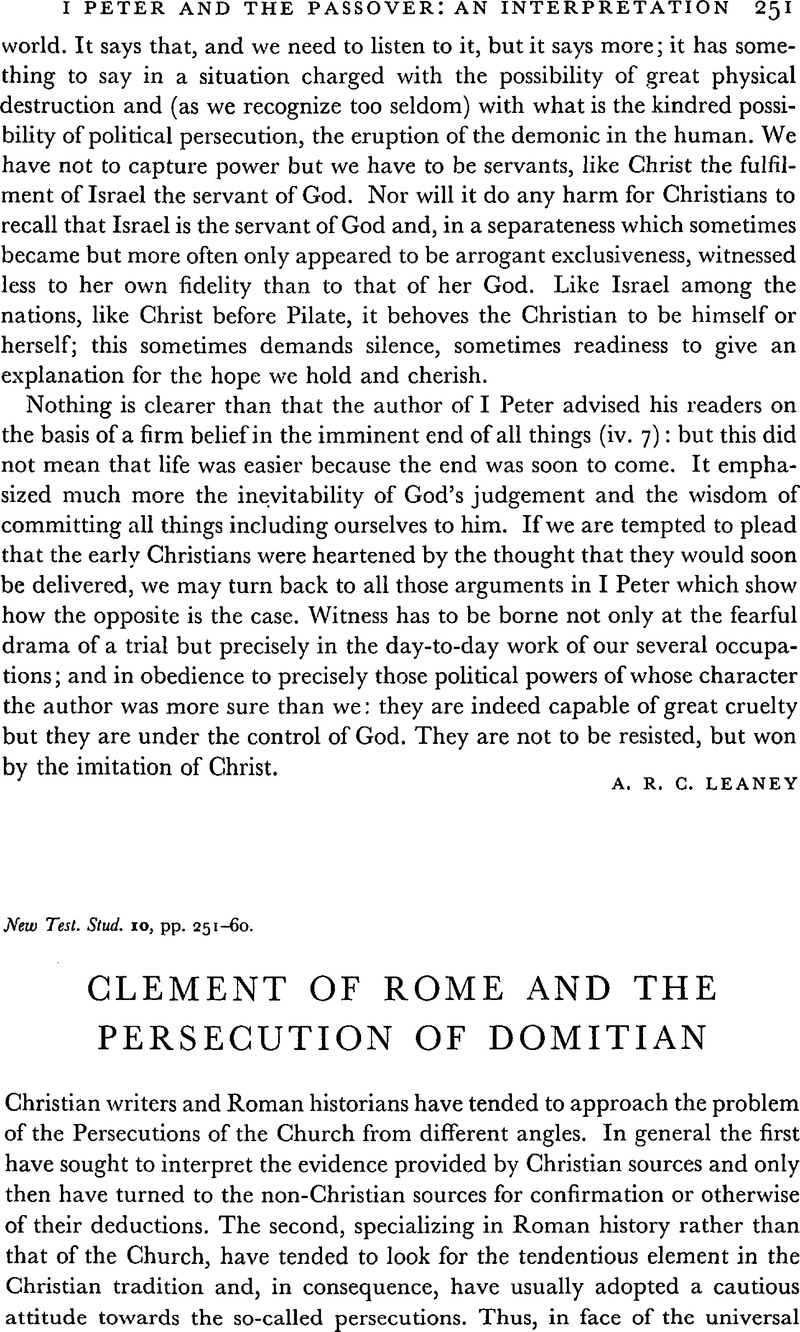Article contents
Clement of Rome and the Persecution of Domitian
Published online by Cambridge University Press: 05 February 2009
Abstract

- Type
- Short Studies
- Information
- Copyright
- Copyright © Cambridge University Press 1964
References
page 252 note 1 Five Roman Emperors, p. 45.
page 252 note 2 J.R.S. xxvii, 90.
page 252 note 3 Essays in Early Christian History, p. 173. See also the discussion by Moreau, J., ‘A propos de la persécution de Domitien’, in La Nouvelle Clio, v (1953), 121–9.Google Scholar
page 253 note 1 Inopia rapax, metu saevus. Suet. Domit. iii, 2.
page 255 note 1 Bishop Lightfoot has given the relevant passages in Clement of Rome, 1, 105–15.
page 255 note 2 Church Quarterly Review, cxxxix (Jan.-March 1945), 154–64.Google Scholar
page 255 note 3 He is rather surprisingly followed by Elliott-Binns, L. E., The Beginnings of Western Christendom, p. 102.Google Scholar
page 255 note 4 Essays in Early Christian History.
page 256 note 1 Op. cit. p. 157.
page 257 note 1 This early dating is also precluded by the fact that the Church of Corinth is called άρχαία (XLVII, 6).
page 258 note 1 Dio states that Nerva forbade the bringing of accusations of Maiestas or ‘Jewish life’ (LXVIII, 1).
page 258 note 2 Op. cit. 1. 29–30.
page 258 note 3 Pliny, in his famous letter to Trajan, says that though many Christians had been tried for their lives in Rome during his recollection, he was ignorant of the procedure followed in such cases. As Pliny was but an infant in the time of Nero, and the other Emperors in his time, save Domitian, were not ‘persecutors’, we may be certain that these trials occurred in Domitian's reign. This is very significant pagan evidence. Cf. Ep. x. 96.
page 259 note 1 Dio, LXVII, 14. This part of Dio's history is contained in the abridgement of Xiphilinus, an eleventh-century monk of Constantinople.
page 259 note 2 Op. cit. p. 160.
page 259 note 3 Cf. Martyr. Polyc. ix; Justin, I Apol. 1, 6 and 11, 8; Athenag. Suppl. 3, 4, 30; Tert. Apol. x seq. See further P. Allard, Histoire des persécutions pendant les deux premiers siècles, pp. 104–5.
page 259 note 4 Smallwood, Miss E. M., in her informative and fully documented article ‘Domitian's Attitude toward the Jews and Judaism’ in Classical Philology, LI (1956), 1–13, has followed Milburn (to whom she does not refer) in seeking to show that Flavius Clemens and Domitilla were σεβόμενοι or god-fearers living on the fringe of Judaism who followed Jewish customs to a sufficient extent to be subject to attack from Domitian. She regards the case for regarding them as Christians as resting on a flimsy foundation. Her theory appears to rest on the following premises:Google Scholar
(i) Conversion to Judaism constituted ‘atheism’ as it involved refusing Domitian the divine honours which he sought.
(ii) The fact that Flavius Clemens held high public office is an indication that he was not a Christian.
(iii) Talmudic and Midrashic writers give support to the view that he was a Jew.
(iv) Indications that the Jewish race was in danger under Domitian are to be found in Josephus' Antiquities.
We have no space to elaborate our objections to Miss Smallwood's thesis in detail but the following points may be noted:
(i) There is no evidence in Classical or Jewish writings that Domitian attacked Jews by race or that they suffered any disabilities during his reign. The status of Judaism as a religio licita continued unaffected and there are no indications that Jews were forced to commit idolatry. Why then assume that god-fearers and proselytes were treated differently from circumcised Jews and regarded as ‘atheists’? The one instance of ‘atheist’ applied to the Jews which Miss Smallwood quotes (by Apollonius Molon—Jos. In Ap. 11, 148) comes from the first century B.C. and is not relevant to Domitian's reign. On the other hand the fact that Christianity was not a religio licita and its followers had the charge of ‘atheism’ commonly levelled against them would appear to support the interpretation which I have given above.
(ii) It is clearly based on an a priori assumption as to the social composition of the Roman Church in the last decade of the first century.
(iii) The Jewish traditions cited by Miss Smallwood are garbled and late and, in particular, there is nothing to show that the proselyte Kalonymos is the same person as Flavius Clemens.
(iv) Josephus' Antiquities only deals with events down to A.D. 66. Deductions as to the sitz-im-leben of Judaism in Domitian's reign, when Josephus' work was completed, are too subjective to warrant any certainty in the absence of direct references.
page 260 note 1 Some scholars think that parts of the Shepherd of Hermas have been influenced by a recent persecution in which some Christians had denounced their brethren—thus creating the problem of whether these lapsi could be later readmitted to communion. In view of the uncertainty as to the dating of the Shepherd I have not used its evidence.
- 3
- Cited by




